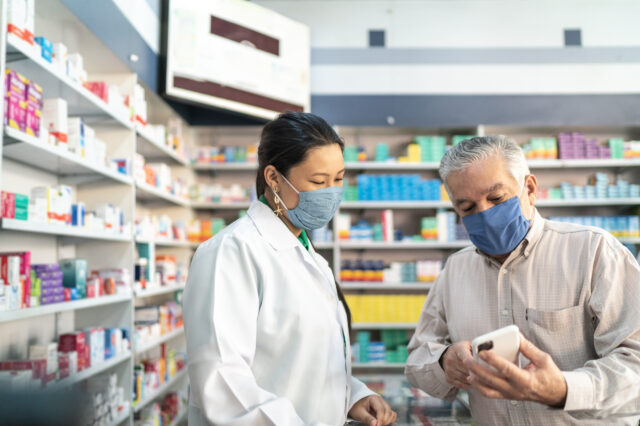American Pharmacists Month: Benefits of a Specialty Pharmacy
October is American Pharmacists Month, a time to recognize and celebrate contributions and positive impact of pharmacy work in our communities.

October is American Pharmacists Month, a time to recognize and celebrate contributions and positive impact of pharmacy work in our communities. In recognition of this significant month, we chat with Lanh Dang, PharmD, BCAP, ambulatory care practitioner at UF Health Jacksonville and clinical assistant professor at the University of Florida College of Pharmacy. Dang shares her expertise in specialty outpatient pharmacy and vaccine hesitancy among patients.
What services do pharmacists provide?
As an outpatient pharmacist, I see patients in the clinics alongside the doctors. Outpatient pharmacists can manage different disease states, such as diabetes, high blood pressure, high cholesterol, pain management and other specialties.
Our inpatient pharmacists are at the bedside with the patients. They make the rounds with the doctors in the hospital, make recommendations, monitor patients for medication effectiveness and adverse effects and verify that while patients are in the hospital, they are on the appropriate medications.
Pharmacists who work in the retail spaces, such as CVS, Walgreens or Walmart, are an integral part of our community. We rely on them to confirm our patients are getting the proper medications and are taking them safely.
What is a specialty pharmacy?
A specialty pharmacy is a team of pharmacists who help patients take specialty medications. They are responsible for getting prescriptions to patients on time and appropriately. Specialty medications are usually high-cost drugs that require a lot of monitoring and high-touch service to our patients. We want to make sure they are taking the medications appropriately. Otherwise, it can lead to worsening of their disease.
Does every hospital or health care institution have a specialty pharmacy?
No. UF Health Jacksonville is unique in the subset of the specialty pharmacy type. We are fortunate to be part of the health system and provide this service because we have access to all the information. This is a great way for us to stay updated on patient care plans and help patients as they go through transitions of care.
Why is it so important for UF Health Jacksonville to be accredited?
Being accredited is a way for our specialty pharmacy to show we provide high-quality care to patients with chronic conditions. Our first accreditation is through the Utilization Review Accreditation Commission, or URAC, an impartial accrediting body that performs a rigorous review of our specialty pharmacy. URAC focuses primarily on patient care, while ensuring we have a high-quality program within our specialty pharmacy. We are always looking for ways to improve the metrics, as well as our patient care.
We are also pursuing specialty pharmacy accreditation through the Accreditation Commission for Health Care, or ACHC. To obtain dual accreditation, both from URAC and ACHC, shows we are taking that extra step to provide high-quality care for our patients.
Do you make regular contact with the patients who are taking specialty medications?
Yes. As part of our accreditation, we have a patient management program. If a patient is on a specialty medication, we proactively reach out to them. When we receive a prescription from a doctor, we review it to make sure it is appropriate and assist with the authorization of the medication. If a copay is too expensive for the patient, we will connect them with copay assistance programs.
Patients and caregivers also receive a full education from the pharmacist before they start taking the medication, or before we dispense the first fill of that medication from our pharmacy. These phone calls are just like an office visit, where we are talking about their allergies, going through their medications and making sure there are no drug interactions with their other medications.
We tell patients how to take and store the medications, what to do if they miss a dose and what happens if they experience side effects. Patients want to know if these side effects are common and if they should be concerned about them. We try to empower the patient to know about their medications, be safe with them and talk with their doctors about them. Our specialty technicians proactively reach out to the patients when the refill is due to confirm they are still doing well on their medications and arrange for the patient to receive them. We also have a 24/7 on-call pharmacist available if there are any urgent clinical questions.
How can specialty pharmacies reduce overall health care costs?
Through patient education and safety, pharmacists may help prevent hospitalizations and emergency room visits, a significant factor in reducing health care costs. When we educate our patients, we make sure they are taking their medications appropriately and help prevent their condition from worsening. With safety, we make sure the correct medication is going to each patient and perform clinical reviews to avoid errors or interactions that could send them to the hospital.
Our pharmacy also participates in a federal medication program where we are able to purchase medications at a reduced cost. Part of our responsibilities as pharmacists is to make sure that we are following all of the rules to maintain our enrollment in the program.
What is the most rewarding aspect of being a pharmacist?
When I worked in rheumatology, I saw a patient who was not doing well on her current medication. We decided to change to another prescription and worked with our specialty pharmacy. Three days later, she was able to start on the new medicine. A week later, she was already feeling better. The providers told us they were thankful for our help.
Visit UFHealthJax.org/pharmacy to learn more about pharmacy services offered at UF Health Jacksonville.
About the author
